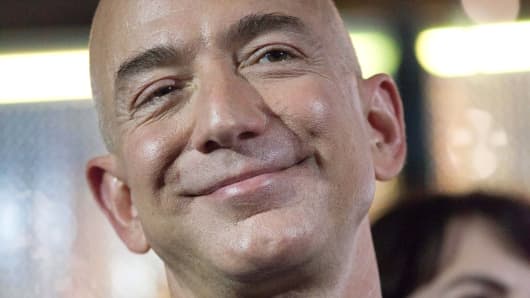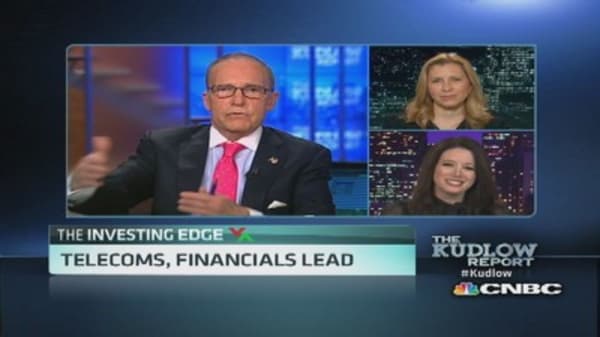Amazon has had an amazing run, seeing its stock increase approximately a staggering 26,500 percent since going public in 1997. Based on its recent press release, touting a best-ever holiday season and more than one million new Prime members during the third week of December alone, its stock price is likely to continue to continue to climb higher.
The company, which is expected to report fourth-quarter 2013 earnings at the end of January, will likely have achieved around $75 billion in revenue for the fiscal year. They have grown their business to dominate markets from e-commerce to web services and you can see how they consistently have an eye towards creating and shaping the future, even if you don't believe in drone delivery.
While Amazon has a number of competitive weapons in its arsenal, ranging from a visionary CEO in Jeff Bezos to outstanding customer service, their absolute biggest advantage lies outside of the company: a free pass from the market.
(Read more: Apple, Amazon downgraded on 'moral and ethical grounds')
Investors have given Amazon an unprecedented pass, allowing the company to maintain a premium valuation for its 16-and-a-half-year public history without the demands of not just strong profits, but for a good part of its history — any profits at all. In fact, Amazon's earnings are projected to be so low in relation to its share price for this fiscal year that the multiple isn't truly meaningful, yet it sustains an ultra-rich valuation — one that currently registers at more than 22 times its most recently reported book value. The market always pays more for possibilities than it does for realities, but at some point it eventually demands that those realities be evaluated.
Investors permitting Amazon to take a long-term view is in direct opposition of the usual "what have you done for me lately" market mantra, especially over such a long period of time. What this has done for Amazon is to continue to allow the company to spend money, innovate and grab market share in a way that is seldom, if ever, afforded to other companies. In fact, I cannot think of another company that has had this long of a sustained earnings pass from the market. That's more than a competitive advantage — that's impossible to compete with at all.
(Read more: Bulls and bears agree: In Amazon, 'something's got to give')
If the market penalized Amazon the way it did other companies over time for a lack of earnings growth, the company would have to shift its focus from investing and innovation to operating efficiency.
Why have investors been willing to turn a blind eye to profitability or even the prospects of it for so long? Are they enamored with the intellectual prowess of Jeff Bezos? Do they believe that the company's bond with customers creates a long-term advantage? Do they justify the revenue multiple and feel sustained by Amazon's increasing revenue and market share? The answer is probably some of each of the above, plus a pervasive belief that when it wants to, Amazon can shift from investment mode — and start dropping money to its bottom line.
However, that likelihood that there are still major economies of scale to be gained in its investments to the point that it can justify Amazon's robust valuation and continual free market pass are hard to argue for. Even assuming a 30x P/E multiple, that would mean that you could glean around $13.33 a share, growing rapidly, from a normalized operating platform. It's quite difficult to build a realistic model that could demonstrate those kind of numbers, if one could build a model from Amazon's limited disclosures at all.
(Read more: Amazon's drone 'head fake' is a distraction: Pro)
Meanwhile, holding Amazon to a long-term view that is not afforded to other companies creates a big hurdle for the competition. It is challenging to compete when you have earnings accountability quarterly and your biggest competitor does not. I have to wonder whether other companies across industries could also scale, innovate and grow by leaps and bounds if they didn't have to worry about making a stringent bottom-line number for Wall Street each and every quarter? It's impossible to know for sure, but it would certainly make growth much more likely.
I love the idea of investors being more long-term focused; it would help bridge the gap between Wall Street and Main Street and allow companies to make better decisions, especially strategic ones that often take a while to materialize or require upfront investment. But, that is unlikely to become a trend anytime soon.
Far before that happens, at some point in the future, Amazon's investors will decide to shift their focus to evaluating realistic bottom-line metrics. In the meantime, Bezos and company will continue to wow with forward thinking and dominate the competition with an advantage afforded to them directly by their investors.
— By Carol Roth
Carol Roth is a "recovering" investment banker (corporate finance), entrepreneur/small-business owner, investor and author of "The Entrepreneur Equation." Follow her on Twitter@CarolJSRoth.




